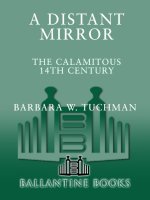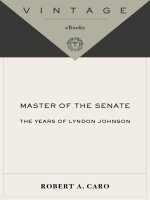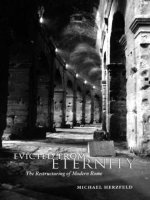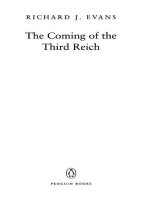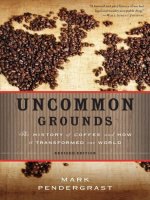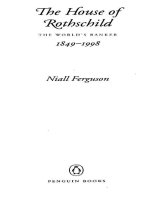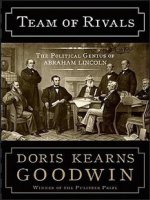Richard beeman theto the unite ers (v5 0)
Bạn đang xem bản rút gọn của tài liệu. Xem và tải ngay bản đầy đủ của tài liệu tại đây (970.29 KB, 157 trang )
Table of Contents
Title Page
Copyright Page
CHAPTER ONE - THE REVOLUTIONARY ORIGINS OF THE AMERICAN CONSTITUTION
CHAPTER TWO - AMERICA STRUGGLES TO ACHIEVE INDEPENDENCE, LIBERTY, AND
UNION
CHAPTER THREE - THE CONSTITUTIONAL CONVENTION OF 1787
CHAPTER FOUR - THE CONTEST OVER RATIFICATION
CHAPTER FIVE - ESTABLISHING GOVERNMENT UNDER THE CONSTITUTION, 1789-1801
CHAPTER SIX - SUPREME COURT DECISIONS THAT HAVE SHAPED AMERICA’S
CONSTITUTIONAL HISTORY
SUGGESTIONS FOR FURTHER READING
PENGUIN BOOKS
THE PENGUIN GUIDE TO THE UNITED STATES
CONSTITUTION
RICHARD BEEMAN, currently a professor of history at the University of Pennsylvania, has
previously served as the chair of the Department of History, associate dean in Penn’s School of Arts
and Sciences, and dean of the College of Arts and Sciences. He serves as a trustee of the National
Constitution Center and is chair of the Constitution Center’s Committee on Programs, Exhibits, and
Education. Author of six previous books, Professor Beeman has received numerous grants and
awards, including fellowships from the National Endowment for the Humanities, the Rockefeller
Foundation, the Institute for Advanced Study at Princeton, and the Huntington Library. His biography
of Patrick Henry was a finalist for the National Book Award. He is, most recently, the author of
Plain, Honest Men: The Making of the American Constitution.
PENGUIN BOOKS
Published by the Penguin Group
Penguin Group (USA) Inc., 375 Hudson Street, New York, New York 10014, U.S.A.
Penguin Group (Canada), 90 Eglinton Avenue East, Suite 700, Toronto, Ontario,
Canada M4P 2Y3 (a division of Pearson Penguin Canada Inc.)
Penguin Books Ltd, 80 Strand, London WC2R 0RL, England
Penguin Ireland, 25 St Stephen’s Green, Dublin 2, Ireland (a division of Penguin Books Ltd)
Penguin Group (Australia), 250 Camberwell Road, Camberwell, Victoria 3124,
Australia (a division of Pearson Australia Group Pty Ltd)
Penguin Books India Pvt Ltd, 11 Community Centre, Panchsheel Park,
New Delhi - 110 017, India
Penguin Group (NZ), 67 Apollo Drive, Rosedale, North Shore 0632, New Zealand
(a division of Pearson New Zealand Ltd)
Penguin Books (South Africa) (Pty) Ltd, 24 Sturdee Avenue, Rosebank,
Johannesburg 2196, South Africa
Penguin Books Ltd, Registered Offices:
80 Strand, London WC2R 0RL, England
First published in Penguin Books 2010
Copyright © Richard Beeman, 2010
All rights reserved
LIBRARY OF CONGRESS CATALOGING IN PUBLICATION DATA
The Penguin guide to the United States Constitution : a fully annotated Declaration of Independence, U.S. Constitution and amendments,
and selections from The Federalist Papers / Richard Beeman. p. cm.
eISBN : 978-1-101-45900-3
1. Constitutional history—United States. 2. Constitutional history—United States—Sources. I. Beeman, Richard R. II. Penguin Books
USA, Inc. III. Title: Guide to the United States Constitution. IV. Title: United States Constitution.
KF4541.P46 2010
342.7302’9—dc22 2010015820
The scanning, uploading and distribution of this book via the Internet or via any other means without the permission of the publisher is
illegal and punishable by law. Please purchase only authorized electronic editions, and do not participate in or encourage electronic piracy
of copyrighted materials. Your support of the author’s rights is appreciated.
A NOTE ON THE TEXT
THE TEXTS IN THIS EDITION ARE BASED on the transcriptions of the Declaration of
Independence and the U.S. Constitution in the National Archives and Records Administration and on
Jacob E. Cooke’s edition of The Federalist Papers. In some cases the punctuation in the documents
reprinted in this edition has been altered for purposes of consistency and clarity; the eighteenthcentury spelling in the original documents has been retained. Following the practice in Jacob E.
Cooke’s The Federalist, the Penguin edition omits the original titles in each of the three essays
reproduced from The Federalist Papers.
THE DECLARATION OF INDEPENDENCE
WHEN IN THE COURSE OF HUMAN EVENTS, it becomes necessary for one people to dissolve
the political bands which have connected them with another, and to assume among the powers of the
earth, the separate and equal station to which the Laws of Nature and of Nature’s God entitle them, a
decent respect to the opinions of mankind requires that they should declare the causes which impel
them to the separation.
This single opening sentence of the preamble to the Declaration of Independence displays
brilliantly the ability of the document’s principal author, Thomas Jefferson, to convey a
wealth of meaning in just a few elegant words. It announces the Americans’ intention of
declaring their independence, of dissolving “the political bands” that had connected them to
England. The justification for this extraordinary act was to be found in “the Laws of Nature
and of Nature’s God.” Jefferson, a deist who did not believe that God played an active hand
in the affairs of mankind, nevertheless did believe that certain natural laws were God-given.
This first sentence also signals Jefferson’s awareness that a compelling public statement of
the reasons for the decision to seek independence from England was necessary if America’s
political leaders were going to earn the support not only of the people of their own colonies
but, equally important, of foreign nations like France, whose support for the American
military effort against England was considered crucial. Before declaring those “causes which
impel them to separation,” however, Jefferson lays out the general philosophy on which
America’s quest for independence was founded.
We hold these truths to be self-evident, that all men are created equal, that they are endowed by
their Creator with certain unalienable Rights, that among these are Life, Liberty and the pursuit of
Happiness.—That to secure these rights Governments are instituted among Men, deriving their just
powers from the consent of the governed.—That whenever any Form of Government becomes
destructive of these ends, it is the Right of the People to alter or to abolish it, and to institute new
Government, laying its foundation on such principles and organizing its powers in such form, as to
them shall seem most likely to effect their Safety and Happiness.
The ideas embodied in the powerful opening lines of the second paragraph of the
Declaration were not Jefferson’s alone. The late seventeenth-century English political
philosopher John Locke had written in his Second Treatise of Civil Government that “life,
liberty, and estate” were among the “natural rights” of mankind; they were rights that existed
even before governments were created, at a time when mankind was living in a “state of
nature.” Jefferson’s fellow Virginian George Mason, again following Locke, had included in
the preamble of the Virginia Declaration of Rights, penned just a few weeks before Jefferson
wrote the Declaration of Independence, “That all men are by nature equally free and
independent and have certain inherent rights,” which he described as “the enjoyment of life
and liberty, with the means of acquiring and possessing property, and pursuing and obtaining
happiness and safety.” But Jefferson’s language has more forceful simplicity. The assertion
that “all men are created equal” was in 1776 more an as-yet-unfulfilled promise than a
statement of political fact, but it has helped to define some of the highest aspirations of the
American nation throughout its history.
The opening lines of the second paragraph were, in fact, merely a preface to the real punch
line of that paragraph: the assertion of the right to rebel against the government of England.
Jefferson reminds his audience that the very purpose of government is to protect the natural
rights of mankind. Since governments, at the time of their creation, base their authority on the
consent of the people whom they are governing, then it is also the right of the people “to alter
or to abolish” that government if its actions threaten the very liberties it was created to
protect. Realizing the dangers of living in a society without government, Jefferson was quick
to add that once the people had severed their connection with their government, they must
move to form new governments whose principles and powers would be supportive of the
people’s “Safety and Happiness.”
Prudence, indeed, will dictate, that Governments long established should not be changed for light
and transient causes; and accordingly all experience hath shewn, that mankind are more disposed to
suffer, while evils are suffer-able, than to right themselves by abolishing the forms to which they are
accustomed. But when a long train of abuses and usurpations pursuing invariably the same Object
evinces a design to reduce them under absolute Despotism, it is their right, it is their duty, to throw off
such Government, and to provide new Guards for their future security.—Such has been the patient
sufferance of these Colonies; and such is now the necessity which constrains them to alter their
former Systems of Government. The history of the present King of Great Britain is a history of
repeated injuries and usurpations, all having in direct object the establishment of an absolute Tyranny
over these States. To prove this, let Facts be submitted to a candid world.
The men representing their colonies in the Second Continental Congress had reached the
decision to declare independence reluctantly, even painfully. They had a deep reverence for
English common law and indeed for the body of law and custom that they called the “English
constitution.” And nearly up to the moment of independence, many of those leaders expressed
great affection for the institution of the monarchy. For all those reasons, the men who endorsed
the Declaration of Independence wished to emphasize that their decision was not one arrived
at rashly—that they had done everything within their power to find some alternative to the
decision to revolt against the authority of the Crown, and that only the “long train of abuses”
and the “repeated injuries and usurpations” committed by King George III had driven them to
this final, decisive action.
Although Jefferson and those endorsing his Declaration were no doubt sincere in their
protestations that independence was only a last resort after all other peaceful means of
protecting their liberties had been exhausted, the Declaration’s description of the actions and
motives of the English king and government is hardly an evenhanded recitation of the facts of
the case. There is an element of hysteria—or perhaps of exaggeration for the purposes of
propaganda—in the charge that the actions of the king and his government were deliberately
designed to “reduce them [the American colonists] under absolute Despotism,” or that the
entire reign of King George III, an imperfect but not evil sovereign, had been aimed at
establishing an “absolute Tyranny” over the Americans. But given the purposes of the
Declaration—to persuade an uncertain American public that revolution was the last and best
hope and to persuade foreign nations to give their aid to that revolution—evenhandedness was
not Jefferson’s highest priority. And so what followed was a long list—taking up more than
two-thirds of the whole document—of the grievances that had impelled Americans to take
such desperate measures.
1. He has refused his Assent to Laws the most wholesome and necessary for the public good.
2. He has forbidden his Governors to pass Laws of immediate and pressing importance, unless
suspended in their operation until his Assent should be obtained; and when so suspended, he
has utterly neglected to attend to them.
3. He has refused to pass other Laws for the accommodation of large districts of people, unless
those people would relinquish the right of Representation in the Legislature, a right
inestimable to them and formidable to tyrants only.
4. He has called together legislative bodies at places unusual, uncomfortable, and distant from
the depository of their public Records, for the sole purpose of fatiguing them into compliance
with his measures.
5. He has dissolved Representative Houses repeatedly, for opposing with manly firmness his
invasions on the rights of the people.
6. He has refused for a long time, after such dissolutions, to cause others to be elected; whereby
the Legislative powers incapable of Annihilation have returned to the People at large for their
exercise; the State remaining in the meantime exposed to all the dangers of invasion from
without and convulsions within.
7. He has endeavoured to prevent the population of these States; for that purpose obstructing the
Laws for Naturalization of Foreigners; refusing to pass others to encourage their migrations
hither and raising the conditions of new Appropriations of Lands.
8. He has obstructed the Administration of Justice by refusing his Assent to Laws for
establishing Judiciary powers.
9. He has made Judges dependent on his Will alone, for the tenure of their offices and the amount
and payment of their salaries.
10. He has erected a multitude of New Offices, and sent hither swarms of Officers to harrass our
people and eat out their substance.
11. He has kept among us in times of peace Standing Armies, without the Consent of our
legislatures.
12. He has affected to render the Military independent of and superior to the Civil power.
13. He has combined with others to subject us to a jurisdiction foreign to our constitution and
unacknowledged by our laws, giving his Assent to their Acts of pretended Legislation:
14. For quartering large bodies of troops among us;
15. For protecting them by a mock Trial from punishment for any Murders which they should
commit on the Inhabitants of these States;
16. For cutting off our Trade with all parts of the world;
17. For imposing Taxes on us without our Consent;
18. For depriving us in many cases of the benefits of Trial by Jury;
19. For transporting us beyond Seas to be tried for pretended offences;
20. For abolishing the free System of English Laws in a neighbouring Province, establishing
therein an Arbitrary government and enlarging its Boundaries, so as to render it at once an
example and fit instrument for introducing the same absolute rule into these Colonies.
21. For taking away our Charters, abolishing our most valuable Laws, and altering
fundamentally the Forms of our Governments.
22. For suspending our own Legislatures, and declaring themselves invested with power to
legislate for us in all cases whatsoever.
23. He has abdicated Government here, by declaring us out of his Protection and waging War
against us.
24. He has plundered our seas, ravaged our Coasts, burnt our towns, and destroyed the lives of
our people.
25. He is at this time transporting large Armies of foreign Mercenaries to compleat the works of
death, desolation and tyranny, already begun with circumstances of Cruelty and perfidy
scarcely paralleled in the most barbarous ages and totally unworthy the Head of a civilized
nation.
26. He has constrained our fellow Citizens taken Captive on the high Seas to bear Arms against
their Country, to become the executioners of their friends and Brethren or to fall themselves
by their Hands.
27. He has excited domestic insurrections amongst us and has endeavoured to bring on the
inhabitants of our frontiers the merciless Indian Savages, whose known rule of warfare, is an
undistinguished destruction of all ages, sexes and conditions.
The opening paragraphs of the Declaration display the talents of Thomas Jefferson as a
literary stylist and a political philosopher. In the list of specific grievances, we see Jefferson
the lawyer at work. It is an exhaustive—and wholly one-sided—bill of indictment of British
rule in America. On the one hand, there is a monotony to the recitation of each of the twentyseven grievances, but on the other hand, as the list of grievances accumulates, Jefferson’s
tone, much like that of a prosecuting attorney delivering his summation to a jury, grows
steadily more belligerent, more heated in its sense of outrage at British depredations. Nor is it
merely the British actions that elicit contempt; even worse is the British intent. The British
government and the British king in particular are portrayed as guilty, not merely of bad
policies, but also of proceeding with malevolent motives. The grievances laid out in the
Declaration are not merely constitutional; they are also intensel y personal.
In the years leading up to independence, the colonists directed most of their petitions and
complaints at the British parliament. They often prefaced those petitions to Parliament with
expressions of their pride and loyalty as British subjects and their affection, even reverence,
for both the institution of the monarchy and the person of the monarch himself, King George
III. But by 1776, the Americans had reached the point where they were denying that
Parliament had any authority over them whatsoever. If Parliament had no authority, then why
even waste time addressing that body? Consistent with its denial of parliamentary authority,
the Declaration studiously avoids any mention of Americans as British subjects. It speaks of
the Americans’ fundamental rights as a “people,” and it lays the blame for the people’s travail
squarely on King George III—the “He” to whom most of the grievances refer. This decision to
direct their ire at the king rather than Parliament signaled the Americans’ intention to affect a
fundamental shift in their allegiance, to sever altogether their relationship with their mother
country, as represented by the king.
Buried in the long list of grievances—seventeenth of the twenty-seven—is the complaint
with which the conflict with England ultimately began, and from which nearly all the other
grievances flowed: the denunciation of the king “for imposing Taxes on us without our
Consent.” The American insistence that the British parliament had no right to tax them without
their consent provoked the first sustained colonial protests, beginning with the Sugar and
Stamp Acts of 1764 and 1765, respectively, and continuing with the Townshend duties in
1768 and the Tea Act in 1773. That this particular grievance appears in the middle of the list
suggests how far the Americans had come in their opposition to British control over their
affairs. The British attempts to tax the colonies were an important catalyst for what would
ultimately become a revolution, but they were only that; the real causes of the American
Revolution went much deeper, to the very idea that only Americans themselves could be
responsible for their own governance.
There were several grievances that emerged as a direct consequence of the British decision
to tax the colonies. The tenth grievance accuses the king of sending “swarms of Officers to
harrass our people,” an accusation that no doubt refers to the British government’s decision to
send additional customs officers to America to attempt to collect the new taxes imposed on
the Americans. The eleventh grievance condemns the king for sending “Standing Armies” to
America “in times of peace.” From the British point of view, the troops were sent to aid the
customs officers in carrying out their duties and to keep the peace in a situation that, from
Parliament’s perspective, was growing increasingly disorderly. From the American point of
view, however, the decision to send the troops was one of the most ominous, for it raised the
specter of military despotism and made an already volatile situation even more so. Adding
insult to injury, the decision to send troops to America was accompanied by another
parliamentary act that ordered Americans to provide lodging for those troops—the subject of
the fourteenth grievance. The thirteenth grievance, one of the most convoluted in the list,
charges the king with combining “with others to subject us to a jurisdiction foreign to our
constitution.” Those “others” were apparently the British parliament, which in the Declaratory
Act of 1766 had asserted its right to legislate for the colonies “in all cases whatsoever,” and
the Board of Trade, which was charged with implementing and enforcing the new taxes
imposed on the Americans.
A significant number of the grievances—nine in all—deal with encroachments on the rights
of the provincial legislatures of the colonies. The king is blamed for refusing to approve laws
passed by those legislatures (number 1); for instructing his governors to prevent laws already
passed from going into effect (number 2); for not allowing laws to go into effect unless the
people give up their right to representation in the legislature (number 3); for calling the
legislatures into session at times and in places that make it difficult for them to do their
business (number 4); for forcing colonial legislatures to adjourn and then preventing them
from doing their business, against their wishes (number 5); for refusing to call for new
elections of representatives, making it impossible for new sessions of the legislatures to begin
their business and leaving the colonies without functioning governments (number 6); for
refusing to agree to laws establishing provincial courts, thus threatening the colonists’ control
over their own judicial powers (number 8); for revoking the charters of government under
which the colonies operate and, in the process, abolishing their laws (number 21); and,
finally, for suspending—and in effect abolishing—some of the colonies’ legislatures, thereby
depriving the colonies of their right to govern themselves (number 22).
It is not at all surprising that the Declaration of Independence would devote so much space
in its list of specific grievances to encroachments on the provincial legislatures. Nearly all the
members of the Continental Congress who signed the Declaration were members of those
legislatures. They had taken pride in the independence and autonomy of their legislatures—
they considered them to be American versions of the House of Commons. But as the conflict
with England escalated, royal governors and other agents of the king not only threatened the
independence and autonomy of the colonial legislatures but also the prestige and power of the
provincial legislators themselves. The Americans viewed these encroachments on their
legislatures therefore not merely as constitutional threats but also as intensely personal
assaults on their prestige and dignity.
Several of the grievances deal with the imperial government’s interference with American
judicial processes: making colonial judges dependent on the British government for their
continuation in office and for their salaries (number 9); depriving the colonists of the right of
trial by jury (number 18); attempting to transport some colonists accused of crimes back to
Great Britain, to be tried there, rather than in colonial courts (number 19); and protecting
British troops, “by mock Trial, from punishment for any Murders which they should commit
on the Inhabitants of these States” (number 15). This last grievance, which most likely refers
to the trial of the British soldiers involved in the Boston Massacre in 1770, was not wholly
fair. Although the British soldiers accused of killing five Bostonians in a scuffle were
acquitted, they did receive a fair trial; indeed the American patriot leader John Adams
stepped forward to defend them.
If the American grievances began with taxation and gradually extended to perceived threats
to colonial legislative and judicial processes, still other grievances came to the fore in the
years immediately preceding independence; it was these grievances that provided much of the
emotional dynamic in the American opposition to British rule. When, in response to the
Boston Tea Party, Parliament passed the package of acts that came to be known as the
Coercive Acts, Americans faced new, and increasingly ominous, threats to their liberties. The
Massachusetts Government Act had the practical effect of replacing Massachusetts’s royal
government and charter with a military government headed by General Thomas Gage, actions
reported in the twelfth and twenty-first grievances, which accuse the king of rendering the
military superior to civilian power and of “altering fundamentally the Forms of our
Governments.” The sixteenth grievance, which complains of British edicts that cut off
American trade “with all parts of the world,” was a response to the Boston Port Act, which
closed Boston’s port to all trade until the town’s citizens paid for the tea they had thrown into
the harbor. The twentieth grievance amounts to a broad-brushed, and somewhat unfair, attack
on the Quebec Act. The intention of that act was to take the first steps in organizing the vast
territories in Canada that England had acquired after its victory over France in the Seven
Years’ War. The act made no provision for representative assemblies in that territory—a step
the Americans interpreted, or perhaps misrepresented, as a prelude to an attack on all
representative government in the thirteen main-land English colonies.
The final five grievances on the list build to a crescendo of outrage over British actions
occurring after the outbreak of actual warfare in April of 1775. The twenty-third grievance
acknowledges the reality of the state of war but places blame for that state entirely on the king.
The twenty-fourth grievance, with its charge that the king has “plundered our seas, ravaged
our Coasts, burnt our towns, and destroyed the lives of our people,” may have been
technically true, for that is the nature of warfare, but it was certainly a one-sided depiction of
the growing military conflict between the two sides. The twenty-fifth grievance, which
condemns the king for sending foreign mercenaries—German Hessian soldiers—to help the
British army fight its war to subdue the colonies, escalates the war of words still further with
its charge that the whole aim of those foreign troops was to “compleat the works of death,
desolation and tyranny,” all carried out in a manner that was “scarcely paralleled in the most
barbarous ages.” In December 1775, after reading and rejecting the so-called Olive Branch
Petition from the Continental Congress, King George III declared the colonies in a state of
rebellion, and in support of that declaration, Parliament passed the Prohibitory Act,
effectively declaring war on American commerce on the high seas and making any sailor on
an American merchant ship liable to seizure and subsequent impressment into service in the
British navy. The twenty-sixth grievance, with its lament that the victimized Americans were
being forced to “become the executioners of their friends and Brethren, or to fall themselves
by their own Hands,” once again lays the blame not at the doorstep of Parliament, but at that of
the king.
The final grievance in the Declaration’s list, the twenty-seventh, is extraordinary in several
ways. The immediate source of the grievance was the proclamation of Virginia’s royal
governor, Lord Dunmore, who promised freedom to any of Virginia’s slaves who deserted
their masters to fight on the side of the British. There is considerable irony, as well as
tragedy, in the fact that it was Lord Dunmore’s offer of freedom to slaves who joined the
British cause that convinced Virginia’s slave-owning class that the British were intent on
robbing them of their liberties—indeed intent on enslaving them. Nor was it the inciting of
“domestic insurrections” alone that alarmed Americans. That final grievance goes on to
denounce the king for inciting the “merciless Indian Savages whose known rule of warfare, is
an undistinguished destruction of all ages, sexes and conditions” to make war against white
English colonists. While the king and Parliament were hardly blameless in the matter of
inciting Indian violence on the American frontier, the American colonists themselves, by their
relentless move westward onto Indian lands, did most of the inciting. And the description of
the “known rule of warfare” of the “merciless Indian Savages” is the most shockingly
ethnocentric piece of language to appear in any of America’s founding documents. Thomas
Jefferson, when he penned those words, may have thought that they would strengthen his
fellow colonists’ commitment to band together to fight the English foe, but the words would
bring no credit upon the author.
In his initial draft of the Declaration, Jefferson included one other item in the bill of
indictment against the king. It is extraordinary both in its length relative to the other specific
grievances in the Declaration and in the passion with which it is articulated. It read:
He has waged cruel war against human nature itself, violating its most sacred rights of life &
liberty, in the persons of a distant people who never offended him, captivating & carrying them into
slavery in another hemisphere, or to incur miserable death in their transportation thither. This
piratical warfare, the opprobrium of infidel powers is the warfare of the Christian king of Great
Britain. Determined to keep open a market in which MEN should be bought & sold, he has prostituted
his negative for suppressing every legislative attempt to prohibit or restrain this execrable commerce
and that this assemblage of horrors might want no fact of distinguished die, he is now exciting those
very people to rise in arms among us, and to purchase that liberty of which he has deprived them, by
murdering the people among whom he also obtruded them; thus paying off former crimes committed
against the liberties of one people, with crimes which he urges them to commit against the lives of
another.
Clearly, the American colonists were not innocent and unwilling victims of British
attempts to impose the institution of slavery upon them. And of course Jefferson’s own history
as a slaveholder—he owned at least one hundred, and perhaps as many as two hundred,
slaves at the time he wrote those lines—raises doubts about the consistency, if not the
sincerity, of his indictment of British complicity in the slave trade. As things turned out,
Jefferson’s statement of principle, if that is what it was, did not survive the drafting
committee’s review. As Jefferson recalled, his condemnation of the slave trade “was struck
out in complaisance to South Carolina and Georgia, who had never attempted to restrain the
importation of slaves, and who on the contrary still wished to continue it.”
In every stage of these Oppressions We have Petitioned for Redress in the most humble terms: Our
repeated Petitions have been answered only by repeated injury. A Prince whose character is thus
marked by every act which may define a Tyrant, is unfit to be the ruler of a free people.
Nor have We been wanting in attentions to our Brittish brethren. We have warned them from time
to time of attempts by their legislature to extend an unwarrantable jurisdiction over us. We have
reminded them of the circumstances of our emigration and settlement here. We have appealed to their
native justice and magnanimity, and we have conjured them by the ties of our common kindred to
disavow these usurpations, which would inevitably interrupt our connections and correspondence.
They too have been deaf to the voice of justice and consanguinity. We must therefore acquiesce in the
necessity, which denounces our Separation, and hold them, as we hold the rest of mankind, Enemies
in War, in Peace Friends.
Having presented its bill of indictment, the Declaration reminds its intended audience that
the colonists had done everything possible to seek a peaceful resolution of their grievances,
only to be rebuffed by further encroachments on their liberty. And, once again taking aim at
George III, it notes that a ruler who is so deaf to the legitimate pleas of his people is nothing
other than a tyrant, “unfit to be the ruler of a free people.” Nor was it the king alone who had
turned a deaf ear to the colonists’ pleas. The Americans had warned their “British brethren”
of the injustices committed upon them, but the British people as well seemed “deaf to the
voice of justice and consanguinity.” Reluctantly, the Americans were forced to the conclusion
that “we must . . . hold them, as we hold the rest of mankind, Enemies in War, in Peace
Friends.” This severance of the kinship between the British subjects of the king and the people
of America represented yet another step toward an irrevocable separation between mother
country and colonies.
We, therefore, the Representatives of the united States of America, in General Congress,
Assembled, appealing to the Supreme Judge of the world for the rectitude of our intentions, do, in the
Name and by Authority of the good People of these Colonies, solemnly publish and declare, that these
United Colonies are, and of Right ought to be Free and Independent States; that they are Absolved
from all Allegiance to the British Crown, and that all political connection between them and the state
of Great Britain is and ought to be totally dissolved; and that as Free and Independent States they have
full Power to levy War, conclude Peace, contract Alliances, establish Commerce, and to do all other
Acts and Things which Independent States may of right do. And for the support of this Declaration,
with a firm reliance on the Protection of divine Providence, we mutually pledge to each other our
Lives, our Fortunes and our sacred Honor.
GEORGIA
Button Gwinnett
Lyman Hall
George Walton
NORTH CAROLINA
William Hooper
Joseph Hewes
John Penn
SOUTH CAROLINA
Edward Rutledge
Thomas Heyward, Jr.
Thomas Lynch, Jr.
Arthur Middleton
MASSACHUSETTS
John Hancock
MARYLAND
Samuel Chase
William Paca
Thomas Stone
Charles Carroll of
Carrollton
VIRGINIA
George Wythe
Richard Henry Lee
Thomas Jefferson
Benjamin Harrison
Thomas Nelson, Jr.
Francis Lightfoot
Lee
Carter Braxton
PENNSYLVANIA
Robert Morris
Benjamin Rush
Benjamin Franklin
John Morton
George Clymer
James Smith
George Taylor
James Wilson
George Ross
DELAWARE
Caesar Rodney
George Read
Thomas McKean
NEW YORK
William Floyd
Philip Livingston
Francis Lewis
Lewis Morris
NEW JERSEY
Richard Stockton
John Witherspoon
Francis Hopkinson
John Hart
Abraham Clark
NEW HAMPSHIRE
Josiah Bartlett
William Whipple
MASSACHUSETTS
Samuel Adams
John Adams
Robert Treat Paine
Elbridge Gerry
RHODE ISLAND
Stephen Hopkins
William Ellery
CONNECTICUT
Roger Sherman
Samuel Huntington
William Williams
Oliver Wolcott
NEW HAMPSHIRE
Matthew Thornton
As the Declaration reaches its conclusion, it asserts for the first time that the
contemplated action is one taken by the representatives of the “united States of America.” And
then comes the operative sentence of the Declaration of Independence: “that these United
Colonies are, and of Right ought to be Free and Independent States,” that they no longer have
any allegiance or obligation to the British Crown or the British nation. Implicit in the final
two sentences of the document is a promise whose means of fulfillment was at that moment
very much unknown. The “United Colonies” were not only declaring their independence but
stating their intention, as independent and united states, to carry out a war against one of the
world’s most formidable military powers, to negotiate a successful peace, to make alliances
with other nations, to promote commerce, “and do all other Acts and Things which
Independent States may of right do.” The Americans intended not only to form independent
states but also to find ways in which those independent states could unite in common cause.
And to fulfill their commitment to that common cause, the Americans, in the final line of the
Declaration of Independence, pledged “to each other, our Lives, our Fortunes and our sacred
Honor.”
THE CONSTITUTION OF THE UNITED STATES
WE THE PEOPLE OF THE UNITED STATES, in Order to form a more perfect Union, establish
Justice, insure domestic Tranquility, provide for the common defence, promote the general Welfare,
and secure the Blessings of Liberty to ourselves and our Posterity, do ordain and establish this
Constitution for the United States of America.
The preamble to the Constitution is a statement of aspiration—a promise to Americans
about the things that the new federal government intended to achieve for “We the People of the
United States.” Some of the specific objects of government stated in the preamble—the
establishment of justice, insuring the peaceful operation of society, and providing for the
common defense—had long been understood to be the primary responsibilities of any
government. The promises to promote the general welfare and to “secure the Blessings of
Liberty” are more open-ended, suggesting that the government’s responsibilities extend not
merely to providing essential services but also to benevolent oversight of the polity. Although
the words of the preamble do not carry the force of law, they have had substantial rhetorical
power over the life of the Constitution.
ARTICLE I
SECTION 1
All legislative Powers herein granted shall be vested in a Congress of the United States, which shall
consist of a Senate and House of Representatives.
It is no accident that the first article of the Constitution deals with the structure and
powers of the Congress, for virtually all of those who took part in the drafting of the
Constitution considered the legislative branch to be the most important and, rightfully, the
most powerful of the three branches of government.
There was broad agreement among the framers of the Constitution that the Congress should
consist of a bicameral legislature. The House of Representatives, the “lower house,” was
conceived to be the “great repository” of the people of the nation at large, while the Senate,
“the upper house,” was to be composed of only the most knowledgeable, well-educated, and
virtuous, who could be relied upon to act as a moderating influence on the whims of the
people at large.
SECTION 2
The House of Representatives shall be composed of Members chosen every second Year by the
People of the several States, and the Electors in each State shall have the Qualifications requisite for
Electors of the most numerous Branch of the State Legislature.
No Person shall be a Representative who shall not have attained to the Age of twenty five Years,
and been seven Years a Citizen of the United States, and who shall not, when elected, be an Inhabitant
of that State in which he shall be chosen.
Representatives and direct Taxes shall be apportioned among the several States which may be
included within this Union, according to their respective Numbers, which shall be determined by
adding to the whole Number of free Persons, including those bound to Service for a Term of Years,
and excluding Indians not taxed, three fifths of all other Persons. The actual Enumeration shall be
made within three Years after the first Meeting of the Congress of the United States, and within every
subsequent Term of ten Years, in such Manner as they shall by Law direct. The Number of
Representatives shall not exceed one for every thirty Thousand, but each State shall have at Least one
Representative; and until such enumeration shall be made, the State of New Hampshire shall be
entitled to chuse three, Massachusetts eight, Rhode-Island and Providence Plantations one,
Connecticut five, New-York six, New Jersey four, Pennsylvania eight, Delaware one, Maryland six,
Virginia ten, North Carolina five, South Carolina five, and Georgia three.
When vacancies happen in the Representation from any State, the Executive Authority thereof shall
issue Writs of Election to fill such Vacancies.
The House of Representatives shall chuse their Speaker and other Officers; and shall have the sole
Power of Impeachment.
The framers of the Constitution stipulated that members of the House of Representatives,
the people’s house, should serve relatively short terms of only two years, after which they
would be required to seek reelection should they wish to continue to represent their state. The
delegates could not agree on who should be allowed to vote for members of the House of
Representatives, so they left the matter of voting requirements up to the state legislatures,
which had up to that time set the qualifications for voters in each of the states. In 1787 all the
states except New Jersey (which briefly permitted females to vote) limited the franchise to
“free men” (a term usually interpreted to exclude free blacks) and most required that voters
own at least some form of property. By the 1820s, most states had opened up the franchise to
free white males regardless of whether they owned property. Subsequent amendments—the
Fifteenth, prohibiting the denial of the franchise on account of “race, color, or previous
condition of servitude”; the Nineteenth, enfranchising women; and the Twenty-sixth,
establishing a uniform voting age of eighteen—served to create a common national standard
for voting in federal elections.
The requirement that members of the House of Representatives reside in the state in which
they were chosen reflected the belief that representatives, if they are to serve the people who
elect them, must have close and meaningful ties to the communities in which those people live.
The “three fifths of all other Persons” referred to in this section is the result of the infamous
“three-fifths compromise,” in which slaves, though not mentioned by name, were to be
counted as three-fifths of a person in the apportionment of representation in the House of
Representatives as well as in the apportioning of the amount of direct taxes to be paid by each
state. The three-fifths ratio was a purely arbitrary one. It was a consequence of a fundamental
contradiction that the Convention delegates were unable to resolve: slaves were human
beings, but by the laws of most states they were also regarded as property. The passage of the
Thirteenth Amendment abolishing slavery rendered this portion of Article I, Section 2 null and
void.
Although the original Constitution laid down a formula for representation based on
population (and “three fifths of all other Persons”), none of the delegates to the 1787
Convention really knew what the actual population of each of the states was. The initial
apportionment of representation was merely a guess, but the Constitution did provide for a
census of the population to be taken every ten years, a practice that began in 1790 and has
continued to the present day.
The “sole Power of Impeachment” referred only to the first step—the equivalent of an
indictment or bringing to trial—in the removal of a federal official. The grounds for
impeachment set down in Article II, Section 4—“Treason, Bribery, or other High Crimes and
Misdemeanors”—have been subject to widely varying interpretations.
SECTION 3
The Senate of the United States shall be composed of two Senators from each State, chosen by the
Legislature thereof, for six Years; and each Senator shall have one Vote.
Immediately after they shall be assembled in Consequence of the first Election, they shall be
divided as equally as may be into three Classes. The Seats of the Senators of the first Class shall be
vacated at the Expiration of the second Year, of the second Class at the Expiration of the fourth Year,
and of the third Class at the Expiration of the sixth Year, so that one third may be chosen every second
Year; and if Vacancies happen by Resignation, or otherwise, during the Recess of the Legislature of
any State, the Executive thereof may make temporary Appointments until the next Meeting of the
Legislature, which shall then fill such Vacancies.
No person shall be a Senator who shall not have attained to the Age of thirty Years, and been nine
Years a Citizen of the United States, and who shall not, when elected, be an Inhabitant of that State for
which he shall be chosen.
The Vice President of the United States shall be President of the Senate, but shall have no Vote,
unless they be equally divided.
The Senate shall chuse their other Officers, and also a President pro tempore, in the Absence of the
Vice President, or when he shall exercise the Office of President of the United States.
The Senate shall have the sole Power to try all Impeachments. When sitting for that Purpose, they
shall be on Oath or Affirmation. When the President of the United States is tried, the Chief Justice
shall preside: And no Person shall be convicted without the Concurrence of two thirds of the
Members present.
Judgment in Cases of Impeachment shall not extend further than to removal from Office, and
disqualification to hold and enjoy any Office of honor, Trust or Profit under the United States: but the
Party convicted shall nevertheless be liable and subject to Indictment, Trial, Judgment and
Punishment, according to Law.
The Senate, as the “upper house,” was conceived as a more deliberative body, whose
members would be comprised of the most virtuous and knowledgeable citizens in the land.
The framers of the Constitution believed that Senators should therefore serve longer terms in
order that they might be better insulated from the immediate pressures of public opinion. One
of the means by which Senators would be protected from popular whims was to provide for
an indirect method for their election, with the legislatures of the individual states being given
the power over such election. The provision for staggered terms of service was designed to
prevent sudden, convulsive turnover in the membership of the Senate.
Consistent with the view that the members of the Senate were expected to possess superior
knowledge and experience, the minimum age of Senators was set at thirty, and the length of
time after becoming a citizen nine years, as opposed to twenty-five years of age and seven
years of citizenship for members of the House of Representatives.
The framers of the Constitution were aware of the necessity of providing for a vice
president, who would assume the president’s duties in the event of his death, disability, or
removal, but they had a hard time thinking of any other functions the vice president might
perform. The provision of Article I, Section 2, designating the vice president as the presiding
officer of the Senate, is the only item in the Constitution that speaks to the limited official
duties of the vice president.
The Senate, as the more deliberative of the two legislative bodies, was given the
responsibility of trying impeachment cases. Seeking to reinforce the principle of separation of
powers, the Constitution designates the chief justice of the U.S. Supreme Court as the person
who would preside over an impeachment trial of the president.

